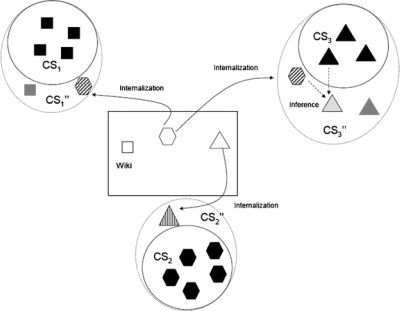Wikipedia-besserwissern analyserad
 Vem hade trott att det här med wikis var så avancerat? I en artikel (1) av ett par tyska forskare tar man hjälp av Niklas Luhmann och Jean Piaget för att försöka förstå vad det egentligen är som sker, socialt och kognitivt, när människor samarbetar kring att bygga kunskap med hjälp av wiki-teknologi (Wikipedia används som exempel).
Vem hade trott att det här med wikis var så avancerat? I en artikel (1) av ett par tyska forskare tar man hjälp av Niklas Luhmann och Jean Piaget för att försöka förstå vad det egentligen är som sker, socialt och kognitivt, när människor samarbetar kring att bygga kunskap med hjälp av wiki-teknologi (Wikipedia används som exempel).Following Piaget's model of equilibration we propose that people engage in knowledge building by contributing new information to wikis and by restructuring existing articles because of cognitive conflicts5. Using Luhmann's theory, this conflict can be described as irritation. We propose that when people work with a wiki they have to see if their own individual knowledge matches with the information the wiki provides. This matching process can lead to different results: If people feel that the wiki's information is congruent to their individual knowledge then there is no need for equilibration and people do not accommodate or assimilate, either internally nor externally. In contrast, if people feel that the wiki's information differs from their own knowledge, there is a need for equilibration, which people can satisfy by processes of internal or external assimilation or accommodation.
(1) Ulrike Cress & Joachim Kimmerle, "A systemic and cognitive view on collaborative knowledge building with wikis", International Journal of Computer-Supported Collaborative Learning, publicerad online 10 januari 2008.
kommentar(er)
| www.flickr.com |
Jag heter Erik Stattin och det här är min blogg. Jag skriver om digital kultur, ungefär. Du får gärna tipsa mig om saker. Kontakta mig på erik.stattin@gmail.com. Jag är mymarkup på Twitter och Delicious.